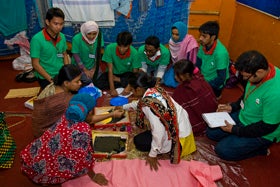
- A flood-affected female resident of a low-income urban settlement (Rashid, 2000: 244)
The urban poor in low-income settlements in the cities of Bangladesh are one of the most vulnerable populations to disasters and climate risks. Nearly 35 percent of the country’s urban population lives in highly dense and populated informal settlements that lack protective infrastructure, basic services and resources needed to face the challenges in an era of changing climate. With the frequency and intensity of flooding as well as cold and heat waves increasing over the years, these marginalized communities are yet to be taken into mainstream climate adaptation planning and policy.
A lack of tenure security coupled with inadequate national interest and efforts leaves one skeptical on institutional reliance for building climate resilience of the urban poor in Bangladesh. In such a complex and severe situation, a part of the solution can be the youth of the country. Young people can be encouraged to engage with these communities for collective action in community clean-up initiatives such as clearing drainage systems, fund-raising for providing resources such as mosquito nets, oral saline, and warm clothes or improving physical infrastructures such as building sanitation facilities that would reduce the risks associated with severe weather events. Youth initiated projects in providing skills-related training and education would further assist long-term resilience building in these communities. Moreover, bringing together youth and different members of low-income settlements allows sharing and dissemination of knowledge along with improvement in social networks, which have many direct and indirect benefits for building resilience to weather events.
Youth-led development work in low-income urban settlements is not a new concept in Bangladesh. I’ve had the pleasure and eye-opening experience of seeing the work of young students of the Bangladesh Youth Leadership Center, the country’s premier leadership training institution, with low-income urban households. As part of their four-month long leadership training program, students from diverse backgrounds work together to utilize their leadership training to design and implement small-scale development projects that address to improve employment opportunities or educational and health outcomes of underprivileged households. Some graduates continue to work with these communities long after completion of their training, reflecting how young skills, determination and passion can be developed and harnessed for long-term development planning.
Time to time the passion and motivation that young Bangladeshis have in serving disadvantaged communities especially in the after-math of disasters have been prominent. The challenge now is to realize and channel this power of youth and make them part of the solution for concerted long-term development efforts such as climate change adaptation. Such efforts would entail not only better climate resilience building of the urban poor in low-income settlements but would also assist in building a generation of young leaders who learn how to serve people through compassionate and inclusive efforts.


Join the Conversation